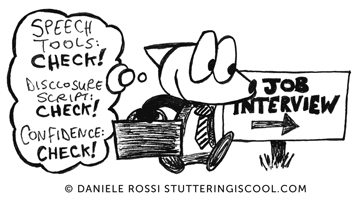
The job search process is harrowing enough. And we’re the lucky ones who get the added challenge of stuttering during a job interview! Stuttering is a challenge only because more awareness is still needed.
It’s important to realise that stuttering doesn't necessarily need to hold you back. Many people who stutter enjoy fulfilling careers as teachers, doctors, lawyers, executives, actors, comedians, soldiers, and so on. Some are even successful in sales roles and entrepreneurship, where communication is everything.
You can still be an effective communicator in spite of stuttering. You can indeed find a job in your life’s calling, just like everybody else. There are fulfilling opportunities in every industry where you can contribute your strengths as a person. The key to surviving job interviews when you stutter, is to prepare beforehand.
1. Accept the challenge
Stuttering adds a challenge. We really have no choice but to deal with it. There are challenges in all areas of life. People of all walks overcome big challenges every day through creativity, determination, and persistence. Stuttering is our challenge. Take ownership of your speech, be strong, and work with your stutter.
If you don't end up getting the job, don’t assume the reason was because of your stuttering. People with perfect speech are having difficulty finding jobs too. It’s all about perfect fit these days. Even if stuttering was the reason, would you really want to work with someone who can’t see past your stuttering?
2. Make friends with your stuttering
Employers seek confidence in job candidates. They need to know that they can count on your expertise, to get the job done. As much as you may hate your stuttering and curse every awkward moment it created in your life, you’re going to have to come to peace with it, if you want to show confidence.
Remember, the people we talk to, take cues from us on how to react to our stuttering. If we show that we are uncomfortable, then they will interpret it as a problem. But positivity and confidence can be spotted a mile away!
You have no idea how much or little information the interviewer knows about stuttering so the job interview setting is the ideal time for some educating. More about this in item #7 below.
3. Build stuttering resilience
Practice being comfortable with stuttering openly in order to lessen worries you may have about stuttering during an interview. Take baby steps out of your comfort zone and go into as many speaking situations as you can. Ask strangers for the time. Make phone calls to random stores and ask for their hours of operation.
Practice mentioning that you stutter to new people you meet and include that you only need some time to get your words out. If all this makes your stomach hurt, just take baby steps. You’ll become less scared after each “challenge” and grow more confident for the next one.
Hang out with others who stutter, be it in person or online, so you’ll feel less alone in your stuttering and pick up more tips.
4. Practice! Practice! Practice!
If you'd rather be more fluent during the phone and job interview process, then I recommend getting into the habit of practicing how to control your speech biology. If you've had speech therapy, practice your speech tools. Get a refresher, if you need it. Even if you haven't had speech therapy, practice saying your name and all industry terms you tend to stutter on.
5. Plan ahead for potential phone and job interviews
In a job interview, you can say stuttering was never an issue in the workplace as much as you like, but it’s only words until you give examples in your responses to your potential employer’s questions. Employers tend to ask behavioural questions in interviews because they believe that past behaviours dictate future behaviours in their workplace.
A common best practice when answering job interview questions is to use examples from your previous workplaces. Mention times where you spoke with clients and colleagues. Have you helped clients? Collaborated with colleagues? Gave presentations? All that stuff proves to the employer that speech has never been an issue. Do you attend Toastmasters meetings? Include that.
6. Chances are your speech won’t be an issue
For the great majority of jobs out there, your level of fluency won’t be an issue. It’s all about fit. Employers are looking for candidates with a specific set of skills, a specific type of experience in their specific industry, and who have a specific kind of personality to fit with their particular team.
Even job seekers with excellent speech are also having a hard time finding work. Computers and robots are eliminating jobs every year, causing a flood of applications to overwhelm HR departments. Most industries aren’t desperate to hire just anyone. Just make sure you fulfill the major needs of the job postings before you spend time sending in your application.
7. To mention or not to mention stuttering
While I personally know a few HR practitioners who have confessed that they never read cover letters and prefer to use computers to filter resumes, I see no need to mention your stuttering on your resume or cover letter in the first place. Besides, you can still do the job regardless of how long it may take you to say something.
The purpose of writing a resume and cover letter is to entice the reader (usually someone in the HR department) to take a look at your resume. And the purpose of your resume is to entice them to call you in for a job interview or telephone interview. So if stuttering isn't relevant to the job description, leave it out.
Daniele Rossi is a CSA Board member, podcaster and co-creator of Stutter Social, as well as a digital strategist and cartoonist. Visit his website for more info.